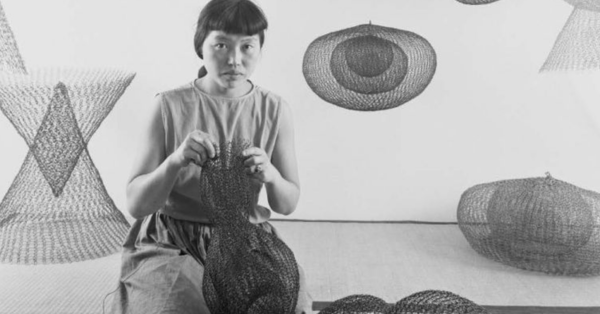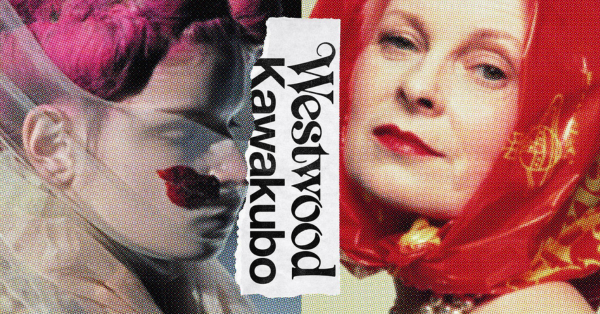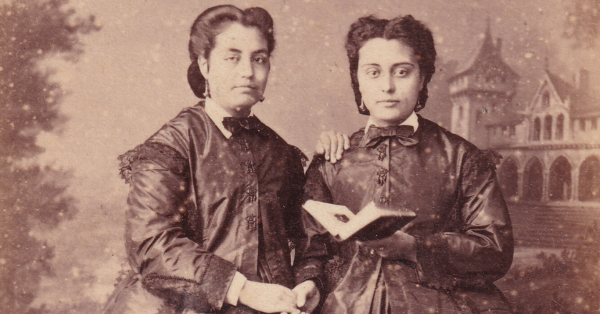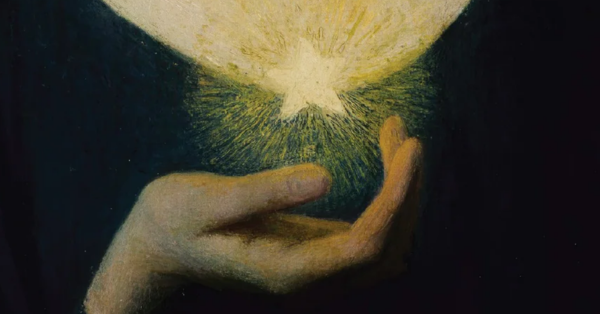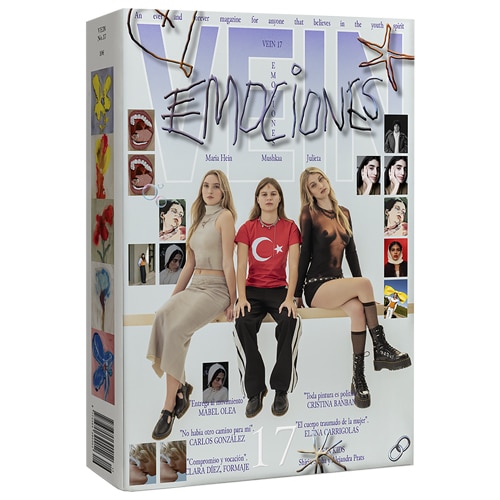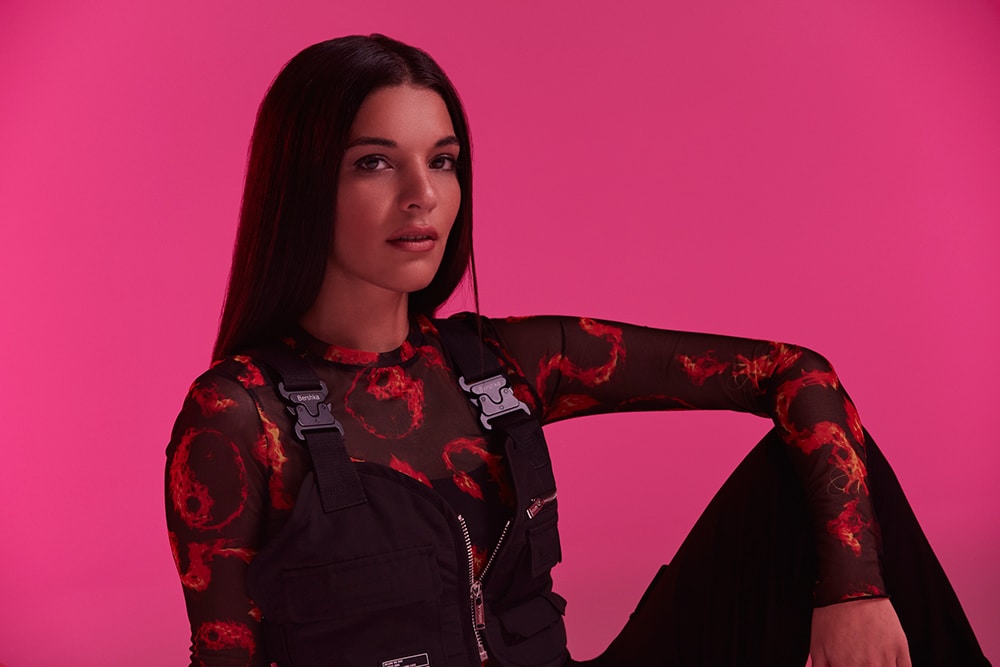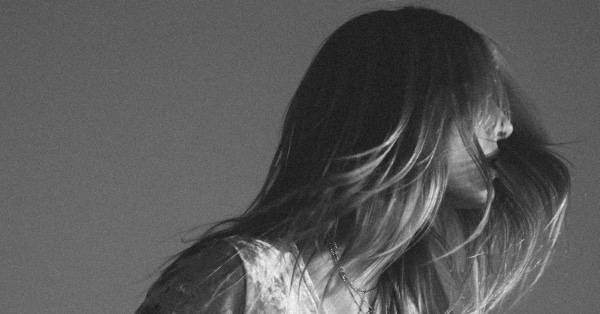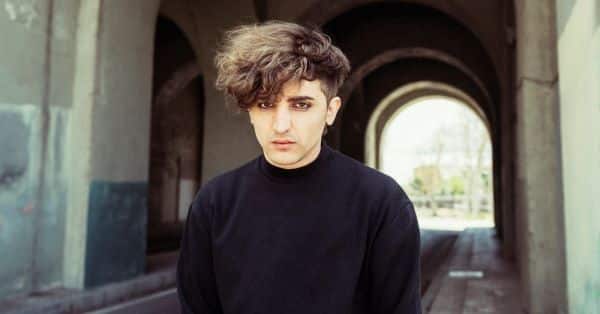A decade has passed since our paths crossed in Paris during a night of label Danse Noire. The energy was raw and untamed, setting the stage for what would become a fascinating musical adventure. We sat down with Aisha to delve into the progress of her label, the core themes of her new album ‘Death is Home’, her performance at L.E.V. Festival, her fascination with Asturias, and her forays into the mystical music scenes of Nepal and beyond.
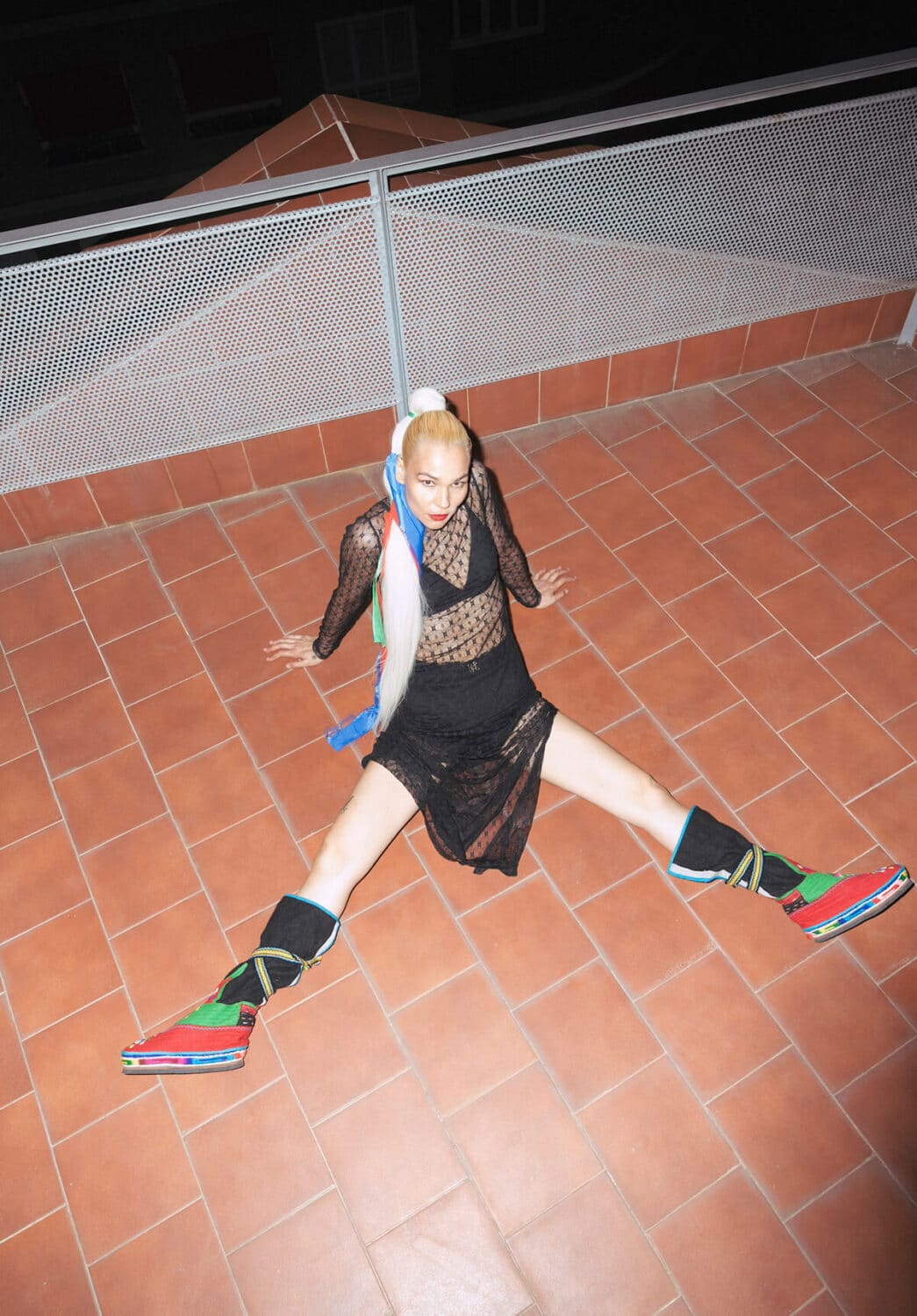
So yes, I wanted to start with a question, because we met 10 years ago in Paris. You guys had a label Danse Noire night with Ivvvo and Hieroglyphic Being.
Oh yeah, oh my god, that one. It was super chaotic because Paris wasn’t ready at the time. The energy was great, but now it’s a bit better in France. I think it’s getting really underground and exciting.
Yeah, there’s a lot of interesting things happening in Paris. I wanted to ask you, what’s happened with the label since then, how’s that story going?
We’re getting more amazing demos than ever. Running a label is about giving visibility to artists who don’t have it. We’ve released music that showcases our unique style, and now the quality of the demos we’re getting is incredible. While the label is not about making money – in fact, we lose money – it’s about building a community of artists with unique voices and stories. These people, each with their own distinctive style, need a platform and a voice.
It’s exciting to see so many demos and foster a community, especially from places with no established music infrastructure. The aim is to unite these local energies and transcend geographical borders. We are planning to organize underground parties in areas dominated by mainstream culture, including a festival in Nepal (where my father is from) that has been delayed but that we are putting back on track.
Now you have me absolutely intrigued with the underground scene in Nepal, could you highlight some of the projects you guys have launched recently at Danse Noire?
Not so recently but we had reissued Gabber Modus Operandi’s first album a few years ago. We recently released Pollution Opera, a collaboration between Elvin Brandhi and Nadah El Shazly. Emma dj also just had a new album and we have exciting newcomers joining too.
There’s a lot to come, creating a kaleidoscope of identities that will define the new era.
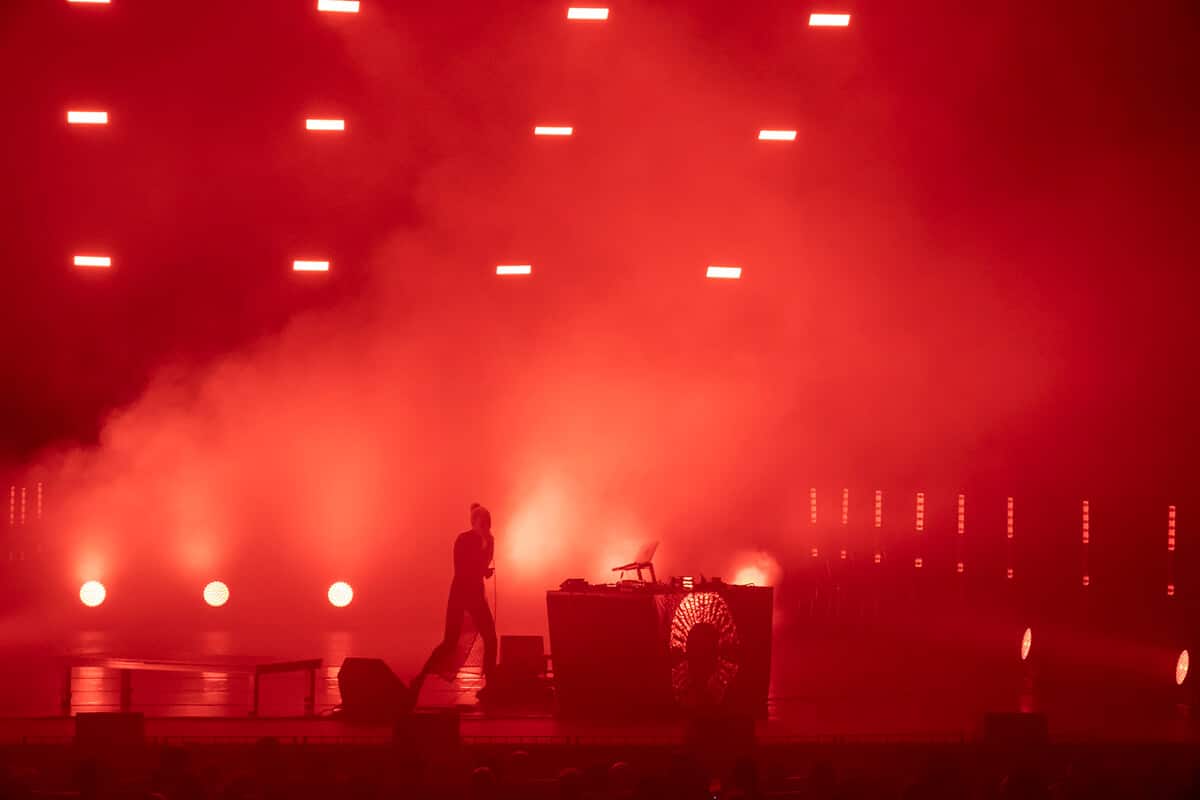
Aisha Devi Performing Live at L.E.V. Festival 2024
Exciting! I saw Gabber Modus Operandi live-they are amazing! Now, let’s talk about you. Your album ‘Death is Home’ came out this year, what have been the central themes or ideas of your recent work?
The album is a synthesis of my personal history and deeper metaphysical questions. It reflects my childhood traumas, identity struggles and feelings of not belonging. I grew up with my grandmother, surrounded by violence and isolation, which blurred my understanding of gender and identity.
Creating music became a way to escape and define myself. It allowed me to construct an alternative reality where I felt safe, like in a video game. Music offered me a place to breathe freely and set my own rules.
By playing live, I met people who, like me, felt marginalized and rejected by society. My performances seek to create a sanctuary for them, opening portals to an intangible reality beyond our physical forms. This journey also took me to Nepal, where I discovered my deceased father, a long and peculiar story that even led me to a TV show in Nepal.
Ah, it’s like one of those TV programmes where you search for your relatives…
The search for my father started with just his name and an address, which initially got me nowhere. I approached the police, who directed me to a local man known as the ‘memory of the neighborhood’. I showed him the only photo I had of my father, which is shown on my album cover as a graphic interpretation. He could not help directly, but referred me to an old doctor who recognized my father from the photo.
The doctor revealed that my father was a drummer, information that resonated deeply with me by connecting pieces of my past. Although the doctor had no further details, he suggested I go on a television program in Nepal. Reluctantly, I agreed. We recorded the program and then returned to Europe. Two weeks later, I received more information about my father.
What a story! You don’t play drums, do you?
I program drums instead of playing them because I’m not good at playing them physically. I love to start tracks by programming drums. Funnily enough, I discovered a woman who was the wife of my father’s best friend, and they had a band together. They were dead by the time I was a kid, So I had no regrets for not looking for my father earlier. He passed away when I was very young. Although I have no blood relatives on his side-he had no other children and did not marry-I found a family connection there. My father was cremated at the Pashupatinath Temple, an important Hindu temple. In the video of ‘My Era’ you can see me in the temple, with cremation fires in the background.
It’s really beautiful. Did you really go there to film?
You can see it in the video, which we filmed in several places in Nepal, including this temple. For me, it was not a farewell but a prayer of thanks to my father, who played an unknown but fundamental role in my life. He helped me grow up by reminding me that I did not belong to the Western world and its collapsing society. I always felt outside this binary and supremacist Western structure.
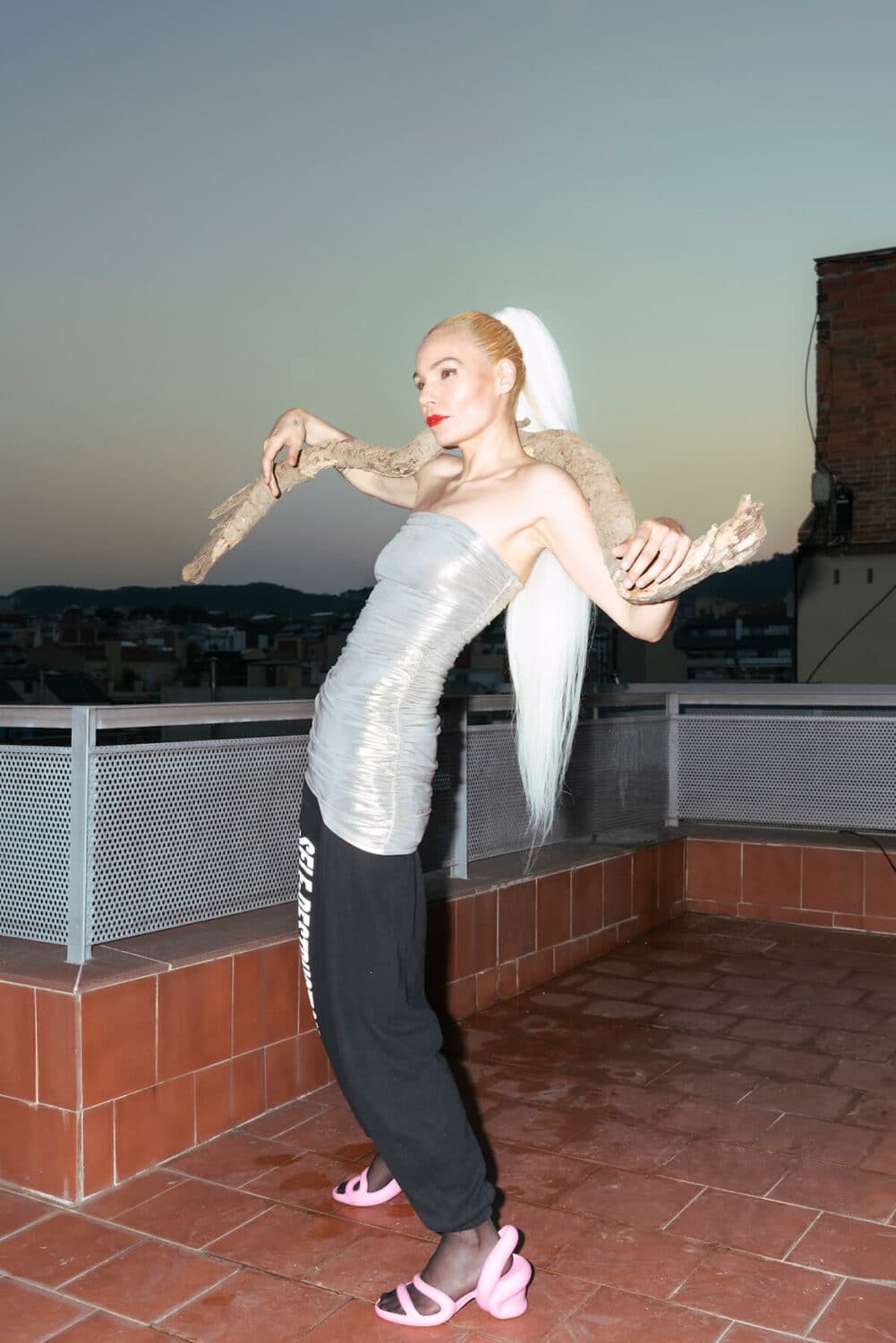
The title of the album feels welcoming and comfortable, suggesting a sense of rebirth. Death, being a natural part of life, can offer strength when accepted. Interestingly, I didn’t perceive any negative connotations in the name.
Exactly, it is about rejecting hyper-materialism. Capitalism drives people to consume life quickly, disconnecting us from our infinite nature. However, music reconnects us to that infinite state, which is why it is integral to rituals and celebrations.
In the Western world, we often miss the deeper purpose of music. As much as I love pop music, I think the club scene holds the answer. I grew up with raves, where I felt the unity of dancing at the same BPM, where music helps us transcend together as one energy. In a club, you forget time and space, transcending through music. This is the idea behind my music production: transcending space and time.
I’d like to talk about your live performances. I’ve seen some of them live and on YouTube, and they feel hypnotic, almost ritualistic, showcasing your roots. How did the transition from pre-COVID to post-COVID concerts affect you? Did it change the way you interact with your audience or approach concert production? How did that chaotic period influence your current live performances?
I saw COVID as a much-needed break. Constantly touring had led to exhaustion, and my body couldn’t take it anymore. The pandemic allowed me to reflect and gain a clearer vision of my work. This break helped me to develop a show that engages all the senses, not only through music, but also visually, with the aim of having a long-term impact and transcending.
In clubs, where the sound system is second to none, I wanted to create an experience that goes beyond mere entertainment. My goal is for the audience to leave with a sense of enlightenment, with the frequencies of the show resonating in them for days. The visual elements are also crucial, as the lights also transmit frequencies. I collaborated with an ingenious team to realize this vision, creating ‘Les Immortelles’, a show that combines sound, visual and physical elements to transcend space and time.
That’s really interesting. When you talk about frequencies and the healing process in music, does this knowledge come from you, perhaps inherent in your origins, or do you have a mentor or guide that influences your understanding of this process?
I believe this process is inherent in all humans. Society often distances us from our inner knowing. Many in my scene, especially the queer community, already have a heightened awareness. As outsiders, we see the world from different angles, which fosters this awareness of alternative dimensions and higher spaces.
For me, it started with meditation, which brings a lot of inner knowledge. I also read extensively and connected the dots between various forms of alchemy, ancient knowledge, animism, paganism and proto-religions that precede Hinduism and Buddhism. Although I am not religious, I see a common thread in these belief systems: the idea of transcendence and reaching higher dimensional realms through self-hypnosis or entrancement.
My thoughts evolved through personal experiences and playing live, where I observed what resonated with people. The feedback from the audience has been invaluable.
When producing music, I apply this metaphysical knowledge, using techniques such as binaural beats and specific frequencies. Over time, I have developed my own methods and ‘magic tricks’ to enhance this process.
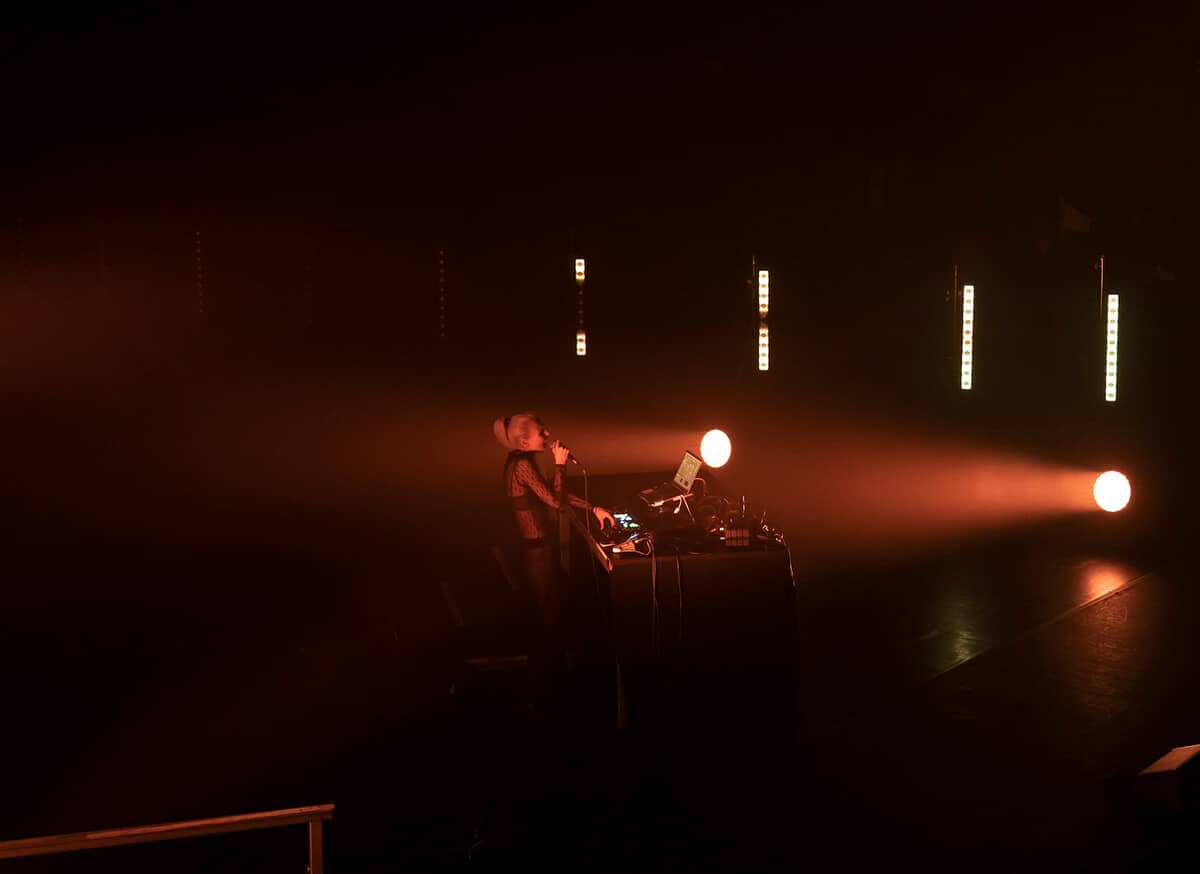
Aisha Devi Performing Live at L.E.V. Festival 2024
Great! What projects and collaborations do you have coming up? And how was the L.E.V. Festival?
It was fantastic! Although it wasn’t my actual touring show in collaboration with Emmanuel Biard, who created the scenography and normally operates the lights. At L.E.V, we created the light environment with the help of the person at the venue who really understood my vision. I gave them a brief and they did an amazing job. The show was seated, which is not my preference as I like people to move freely and express themselves with their bodies. But I got people up and moving a bit.
Asturias was quite mystical and I loved the experience. I had never been there before. Spain, especially Catalonia, has a certain secret and mystical force that I love to explore.
What’s next?
For upcoming projects, I’m balancing between club shows and festivals. I will be touring with Emmanuel Biard for ‘Les Immortelles’ and performing the show ‘Aetherave’ in clubs. Although both shows are relatively similar narratively, the visual elements that Emmanuel brings elevate the experience to another level.
Immersive level?
A journey really! I’m happy to be touring with Emmanuel and will be performing in various venues, as well as starting an exciting new collaboration with someone I really admire.
For a long time I focused on solo work, exploring my inner world. Now, I feel ready to collaborate and create projects with others, which is a new and exciting phase for me.
Thank you Aisha.
With love.
Next show: Aisha Devi + Emmanuel Biard 13 June at Sónar Festival Barcelona. For more: @aishadevi5d
Portraits credits:
Photography by Cristian Andersson @cristian.andersson_
Styling by Mary Garlic 2000 @marygarlic2000
Muah by Sharon Soe @sharon.soe

